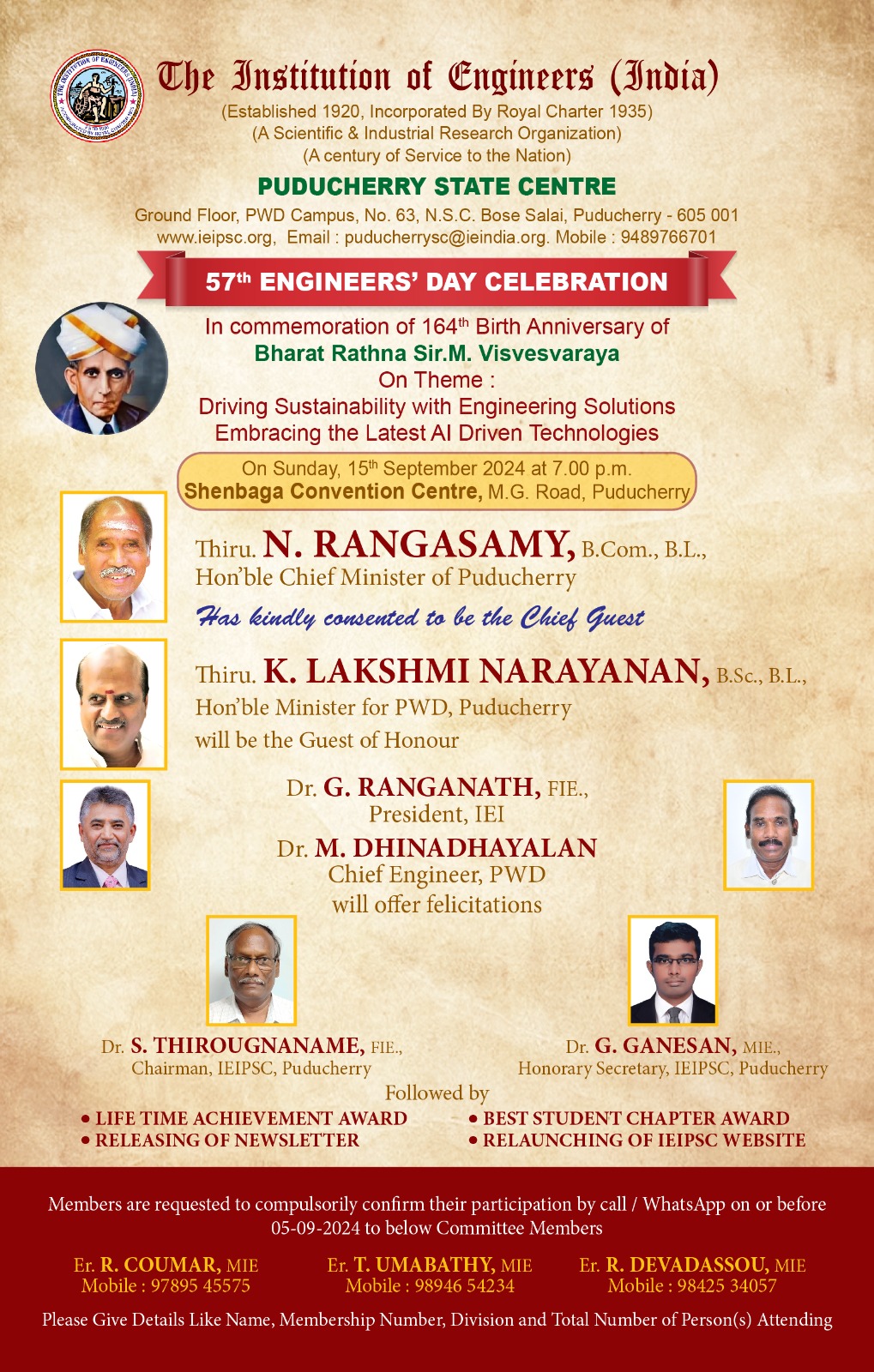The Institution of Engineers (India) [IEI] is the largest multi-disciplinary professional body of engineers, established in 1920 with its Headquarters located in Kolkata and incorporated under Royal Charter on 9th September, 1935 by the then His Majesty of King George V. The Royal Charter endowed the Institution with the responsibility to promote the general advancement of engineering amongst its members and persons attached to the Institution. After Independence, the Institution is a “Body Corporate” protected under Article 372 of the Constitution of India. The Institution of Engineers (India) is administered by a National Council with the President as its Head.
The Institution has been serving the engineering fraternity for over a Century with its national and international presence through 125 Centres spread all over India, 6 Overseas Chapters, 6 Fora and an Organ namely Engineering Staff College of India (ESCI), Hyderabad. The Institution encompasses 15 (fifteen) engineering disciplines with a Corporate membership of over 2 lakhs.
IEI has been recognized as Scientific and Industrial Research Organization (SIRO) by the Ministry of Science & Technology, Govt. of India and besides conducting its own research, provides Grant-in-Aid to UG/PG/ PhD students of Engineering Institutes & Universities.
The Institution of Engineers (India) is the first professional body to represent India in several International Bodies, such as the World Mining Congress (WMC), the World Federation of Engineering Organizations (WFEO), the Commonwealth Engineers’ Council (CEC), the Federation International du Beton (fib), and the Federation of Engineering Institutions of South and Central Asia (FEISCA). It also has bilateral agreements with a number of professional societies across the globe.
IEI holds the International Professional Engineers (IntPE) Register for India under the global International Professional Engineers Alliance (IntPEA). The Institution also awards the Professional Engineers (PE) Certification. The Institution of Engineers (India) as a pioneer body has been conducting Sections A & B Examinations popularly known as AMIE, successful completion of which is recognized as equivalent to a degree in engineering by the Government of India, the Union Public Service Commission, the State Governments and many Public / Private Sector organizations in the country.
Ever since its inception, IEI has been the forerunner in setting up national standards for promoting the country’s industrial base which culminated on the formation of the Indian Standard Institution (ISI), now called as Bureau of Indian Standards (BIS). IEI, in collaboration with Springer Nature Pvt. Ltd., regularly publishes peer-reviewed international journals in five Series, covering fifteen engineering disciplines.
IEI issues membership certification to the eligible engineers, technologists and scientists. Charter Engineer, Professional Engineer and International Professional Engineer certifications in various disciplines of engineering are also issued by this Institution.
During Indian Engineering Congress, National Conventions, Engineers’ Day, recognitions and awards are conferred upon the distinguished engineers in recognition of their contributions in the engineering domain.
The Institution maintains a panel of highly qualified and well experienced Arbitrators having technical and professional engineering competence covering 15 core engineering disciplines from amongst its Fellow members who are attached to 125 State and Local Centres of the Institution located all over the country. IEI awards a certificate to the empanelled arbitrators in recognisition of their expertise in the field of arbitration. The Institution appoints arbitrator from its panel of arbitrators in various disputes that arise by and between the parties during execution of works / supplies contracts
The State / Local Centres of IEI spread across the country do organise technical activities and provide platform to the stakeholders, technocrats, policy makers and others to share their expertise to benefit the engineering fraternity.
IE(I) regularly publishes peer reviewed international Journal in five series, viz. Series A, Series B, Series C, Series D, Series E, covering 15 engineering disciplines.
The 15 engineering disciplines are:
1. Agricultural Engineering Division (AG)
2. Architectural Engineering Division (AR)
3. Aerospace Engineering Division (AS)
4. Chemical Engineering Division (CH)
5. Computer Engineering Division (CP)
6. Civil Engineering Division (CV)
7. Electrical Engineering Division (EL)
8. Environmental Engineering Division (EN)
9. Electronics & Telecommunication Engineering Division (ET)
10. Mechanical Engineering Divisions (MC)
11. Metallurgical & Material Engineering Division (MM)
12. Mining Engineering Division (MN)
13. Marine Engineering Division (MR)
14. Production Engineering Division (PR)
15. Textile Engineering Division (TX)


